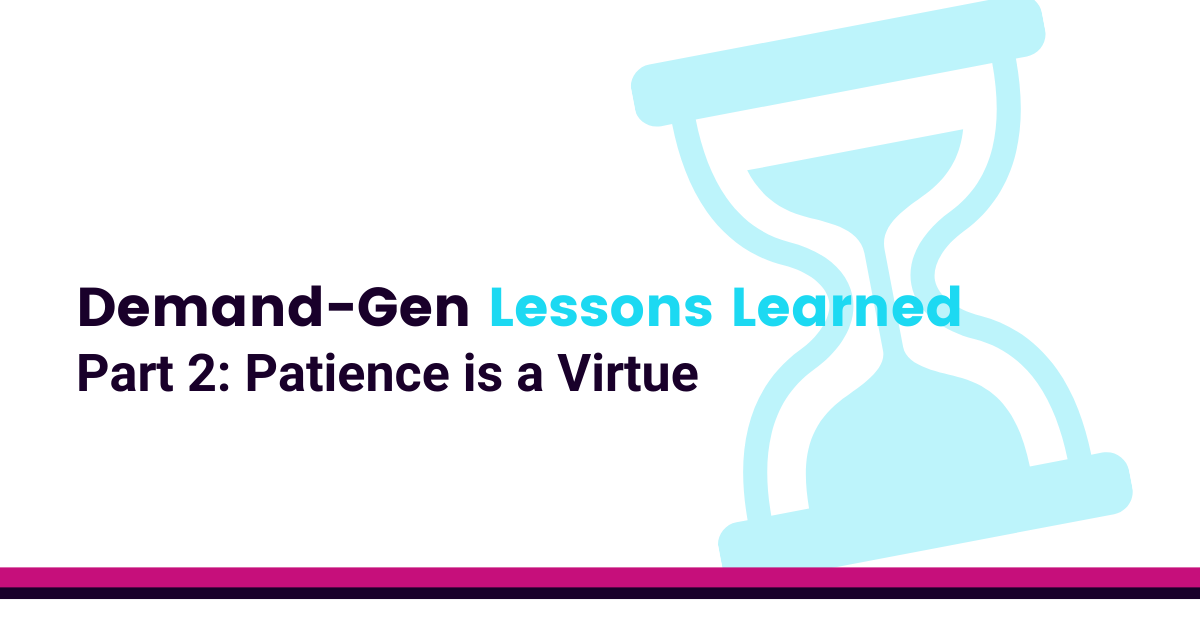

Patience. The Hardest Lesson.
When I was a kid a close family friend used to say to me “patience, patience is a very big word,” because I had none. When I wanted something, I wanted it now. It was such a running theme she even gifted me a handmade ceramic jewelry box with the quote painted on the inside. I find myself reciting the phrase now to my 3-year old as I see so many of my own qualities, impatience included, shine through in her.
I wish I could say I grew out of it, but in a lot of ways I didn’t. I like results. I like checking things off of my to-do list. I like doing things and seeing immediate impact. But, if there’s one thing I have learned working in B2B marketing it’s that instant gratification is fleeting and that truly impactful results take time.
So, here it is. Our second installment of Lessons Learned in the life of a B2B marketing team. Patience. Honestly, I think it’s the hardest and most under-appreciated aspect of demand-generation.
The Element of Time
The life of a CMO can be relatively short. In fact, the CMO has the shortest tenure of anyone in the C-suite. I would venture to guess that one reason is because the toughest thing for a CMO to overcome is educating the C-suite and the board about how marketing works and the compounding nature of the results it delivers. Increased pressure to prove and deliver ROI paired with the element of time required to make an impact is a tough nut for any CMO to crack.
Let’s think about the different elements:
Demand-Gen
In the life of a start-up, you don’t really have the luxury of focusing solely on building a brand or generating awareness. Of course these things are critical to success, but with tight budgets and even tighter timeframes, everything you do has to be about generating demand. Building your brand helps. Awareness is key. Neither can be done without being tied to a demand-generation campaign in those early days.
If a CMO attends one board meeting without being able to answer “how many leads did you generate?” or “you spent $xx, did it work?” I can promise they didn’t do it a second time. Awareness campaigns, dark social, thought leadership, brand, they all feel good. They all have merit. But when your phone rings at 7AM on a Monday morning and it’s the head of sales calling, I can promise you it’s not to ask how the brand campaign is doing. They want to know where their leads are.
That’s all to say, marketing in the early days is all about demand-generation. But, you don’t just flip a switch, turn demand-gen on, and close deals all in the same week. Or quarter for that matter. Why?
Content
Demand-gen doesn’t really work without great content. Website content. Downloadable content. Webinars. Videos. Blogs. Content takes time to produce. And, to produce it you need writers who understand and can translate your messaging into content all across the buyer’s journey. But all the content in the world can’t fix poor messaging.
Messaging
Messaging is hard. It’s a great topic for another Lessons Learned post. Sometimes, the people who know your product the best actually have the hardest time articulating its value in a simple way. That’s why companies often don’t get this right the first time around and end up refining and revisiting it over time.
Programs
Once you have your message and have used it to build some solid content, you need to determine your program mix. Your programs are what will deliver your message to the market to generate demand. You have to ensure they are pointed at the right people, at the right companies, at the right time. It would be borderline lucky to get this right the first time. It requires testing and repetition. All of the intent data and CPL (cost per lead) programs in the world can’t solve for all of the things that need to line up for a prospect to buy. Is the budget available? Did the decision maker go on parental leave? Did the budget owner decide to leave the company? So many things can add time to the sales cycle that are completely out of your control.
Results
As we laid out above, it takes some time to even get to the place where you can hit go on demand-gen. Then, once you do, you may hook an initial prospect in your first program. But, they may not be ready to buy. So, you put them in your nurture campaign and bring them along their buyer’s journey. After a few months, they’re in a position to talk to sales. Your sales cycle alone may take 90-days. You’re now 6-8 months into your marketing journey before you close your first deal. And that’s if you got everything right the first time!
Patience, patience is a very big word.
We see this happen a lot. And, we get it. Startup life is not for the faint of heart. You only have so much time and so much money to get traction. But we see over and over again teams hit “go” and expect the growth engine (marketing & sales) to kick into gear and immediately deliver results. Then, after 6-12 months if they haven’t seen hockey-stick-like growth they get squeamish. The board is asking questions. The pressure is on the P&L. Then, marketing gets the signal. Stop spending. We need to preserve cash. And, while we get it, we wish everyone understood the impact of that. The budget you already spent will continue to deliver for a few quarters, but then things will dry up. Momentum will be lost and it will be hard to quickly get it back. Because the truth is, anyone looking to spin up marketing and see big results in the same year is setting themselves up for failure. Year 1 is about setting the foundation and seeing incremental traction in the second half. Continuing to invest ahead of ROI is where you have the opportunity to really set yourselves apart.
As our CEO Josh Verrill says:
Demand–gen = Messaging x Content x Program Execution, to the power of time (and patience).
If you’re facing these challenges and you need an experienced demand-gen team to come in and help, reach out. We help clients through this everyday. Including, framing the education required for the c-suite and board when it comes to early stage marketing.
We’d love to connect!
Interested in trying the 4AM Platform for free? Create an account and let us know what you think!


